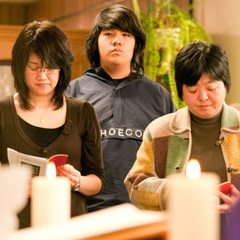Lachapelle was the first confirmed Canadian fatality. He was killed as he rushed back from a meeting in Sendai to be with his parish in Shiogama, in northwestern Japan close to the quake's epicentre. On his way back to his parish after the initial trembler, the Quebecois missionary was met by a tsunami and died of a heart attack.
A member of the Quebec-based Société des Missions-Etrangeres de la Province de Quebec, or PMEs, Lachapelle had been a high school teacher and principal and a parish priest in Japan since 1961.
All of about 35 members of the Toronto Japanese Catholic Community reported that their families in Japan were alive and safe, though some were stuck in the cold without electricity. Cellphones have provided the most reliable communications.
Yushiko Huang found herself on the edge of tears Sunday morning as she sang "On Eagle's Wings" with her parish choir. Her brother and sister working in towns west of Tokyo survived the quake and suffered the chaos and uncertainty that followed. It took two days for word to reach Huang in Canada that her siblings were safe.
Misako Chiba's Canadian-born son Lei Chiba was in Japan for the first time in his life when the earthquake hit. She received an e-mail from her son in Gunma Prefecture, central Japan, almost immediately after the quake. Unlike Japanese who have experienced smaller earthquakes all their lives, Lei reports that the disorienting experience has left him anxious and unable to sleep.
The Toronto Japanese Catholic Community collected money for a donation to the Red Cross for emergency relief. The opportunity to pray together in Japanese has been a consolation, said Chiba.
"We pray in Japanese. It's the same prayers, but more," she said.
{iarelatednews articleid="5216,5213,5210"}


 TORONTO - Toronto's Japanese Catholic Community was relieved and consoled by the opportunity to pray together for their families, their country of birth and for Fr. André Lachapelle, the first Canadian victim of the 9.0 earthquake in their home country.
TORONTO - Toronto's Japanese Catholic Community was relieved and consoled by the opportunity to pray together for their families, their country of birth and for Fr. André Lachapelle, the first Canadian victim of the 9.0 earthquake in their home country.